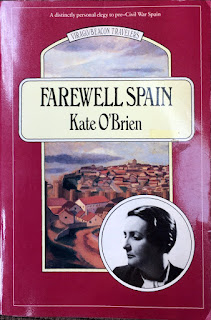You might guess from the title above that the nationality I've blanked is 'Spaniards', and that the time of its writing in early 1937, and of course it is. But it resonates."...and in any case, say only [blank] were fighting this war it is being fought for an issue which is everyone's immediate concern everywhere. It is a war waged by the forces of militaristic absolutism against democracy."
"But it is no good. The cathedral is on your conscience. You paid good money and took some trouble to get here to see it, and you can sit in a café anywhere. Ah, turismo, what a slave-driver you are!"
O'Brien arrives by boat in the north. She visits Santander, Compostela, Salamanca, Ávila:
"All the rest of the town [Ávila] is lovely. It slithers carelessly about the sides of a golden hill and west and south down to the Adaja. It is placed high, but far away on every side the cold points of mountains fence its landscape in."
O'Brien is quite taken with Saint Teresa of Ávila, and went on to write a book about her. (She had been raised Catholic, but was agnostic as an adult.) She gets to Madrid, by then under attack from the Nationalist forces, though it hasn't yet fallen. Her final stop is Burgos. The edition I have is a Virago reprint from 1985 with illustrations and an introduction by Mary O'Neill, her life partner.
I've never read anything else by Kate O'Brien (have you?) and I quite liked it. She's best known as a novelist, I think. I'm going to have find other of her books.
I read it now because we're going to Spain soon for a little over two weeks. (Yay!) This was the trip we'd planned for two years ago, but then had to cancel at the last minute. We'll mostly be in the south (Córdoba, Granada, the Alhambra) so, in fact, the book didn't do much to prepare me, but that's OK, but it was still pretty good...
It's nice to be able to go somewhere again.
And not only is this a place I want to go visit, it is a place I'm actually going to go visit!


I've always wanted to go to Spain! Happy traveling. :D (And I hope you post some fun pics from your trip.)
ReplyDeleteI'm looking forward to it! It's been so long since I've been able to travel at all.
DeleteI may have mentioned at the time that I was in Cedeira, Galicia, from December first to February fifteenth, mainly roaming the coastal hills.
ReplyDeleteI think you did mention—it should have been pretty great. We decided for something a little warmer...though we talked about the north at one point. Also for my benefit, it’s a bit more Roman.
DeleteI think you did mention—it should have been pretty great. We decided for something a little warmer...though we talked about the north at one point. Also for my benefit, it’s a bit more Roman.
DeleteOh I was going to say—and did say in the first comment that fell through the cracks— that we’re in Córdoba at the moment.
DeleteThey do go on about the Celtic past in Galicia, though the Celtic language was extinguished there by Roman influence, and Galego, I am told, is actually more latinate than standard Spanish, the Arabic influence naturally having been less that far north.
ReplyDeleteThey went on about their 'tres culturas' in the south, but then in Córdoba tourist office, in addition to the three other religious symbols, they added a knot for the Celts.
DeleteI was struck how all the castles in the south, even those built after the reconquest, were called alcazars. But Jess, whose Spanish is pretty good, assures me they were called a castillo in the north. (And not whatever the Celtic would be.)